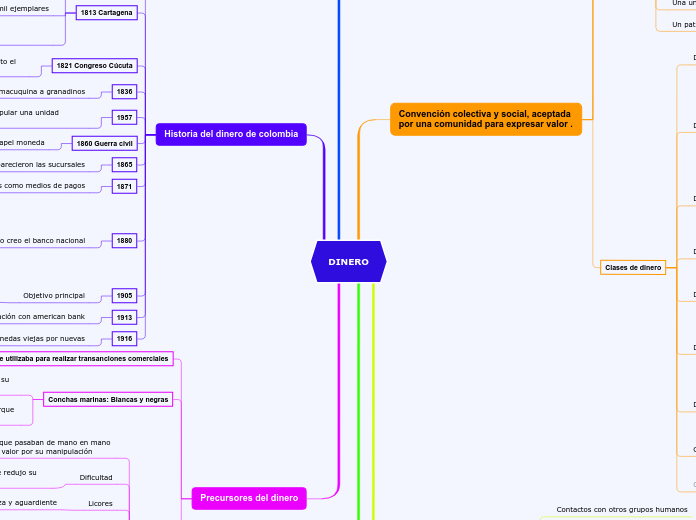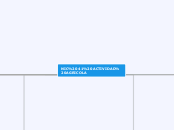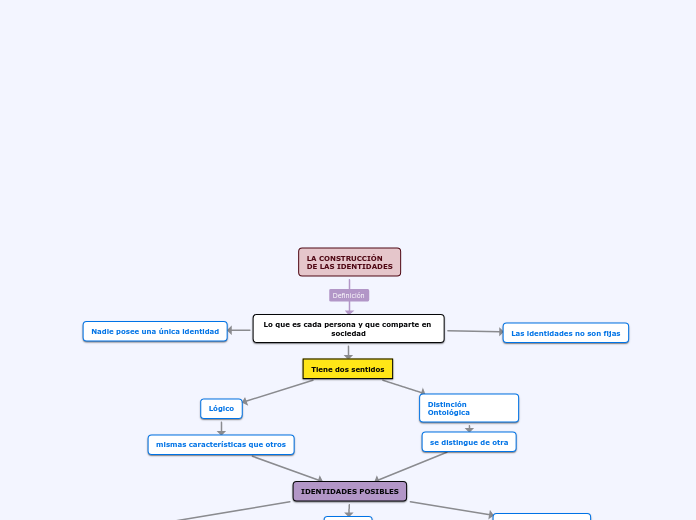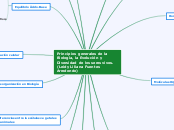Es el trabajo colectivo en forma conjunta para hacer frente las situaciones adversas, en la producción como en los frutos obtenidos para realizar intercambios
DINERO
The part of speech is a category to which a word is assigned according to its syntactic functions. In English the main parts of speech are noun, pronoun, adjective, determiner, verb, adverb, preposition, conjunction, and interjection.
Precursores del dinero
A conjunction is a word like 'if' 'but' or 'and' which is used to connect sentences or clauses together.
Tabaco
OTROS
Piedras planas circulares, diamantes, piezas de vestir
Petates cráneos humanos y cigarrillos
Artículos metálicos
Hachas, cuchillos, espadas, puntas de flecas, barras metálicas y alambres
La dificultad de estos eran que se oxidaban, se desgastaban y perdían volumen
Animales
Se intercambia dependiendo de la zona
Partes de animales
Pieles y colas de animales
Sartas de dientes y colmillos de animales
Alimentos
Arroz, cacao, aceite de oliva y sal
de alli sale la palabra salario
Licores
Whisky, Brandy cerveza y aguardiente
Dificultad
Mucha siembra de tabaco fue lo que redujo su poder adquisitivo
Eran hojas secas que pasaban de mano en mano por lo cual perdía valor por su manipulación
Conchas marinas: Blancas y negras
Subordinating conjunctions are conjunctions that are used at the beginning of subordinate clauses. Some examples of these conjunctions are: although, after, before, because, how, if, once, since, so that, until, unless, when etc.
Las conchas blancas eran de menor valor porque abundaban
Las conchas negras eran de mayos valor por su escasas
Se utilizaba para realizar transanciones comerciales
Coordinating conjunctions always connect phrases, words, and clauses. They are: for, and, nor, but, or, yet, so.
This stew is savory and delicious.
Historia del dinero de colombia
An adverb is used to describe a verb, but it can also describe an adjective or another adverb.
Adverbs normally help paint a fuller picture by describing how something happens.
1916
Cambiar las monedas viejas por nuevas
Monedas de oro y plata
1913
Contratación con american bank
1905
Objetivo principal
Convertir moneda plata en moneda metálica
1880
El gobierno creo el banco nacional
Créditos contratación de prestamos y deudas publicas
Prestar al gobierno servicios de consignación
Nacional banquet
1871
Utilización de billetes como medios de pagos
1865
En bogota aparecieron las sucursales
Banco Londres, México y Suramérica
1860 Guerra civil
Papel moneda
1957
Se dicto una ley para estipular una unidad monetaria
Se edito el escudo, doblón, cóndor y onza
1836
The intensifiers strengthen adverbs adjectives and adverbs and down- toners make them weaker.
Cambia de macuquina a granadinos
Extremely, Very
1821 Congreso Cúcuta
La gran Colombia fue cuando se implemento el peso plata
1813 Cartagena
El objetivo era gastar la plata en la independencia
Primer billete en Colombia, 300 mil ejemplares
Tuvo poca aceptación
Always, usually, Never
Empezó en la época de la colonia española con monedas de oro y plata
Los pagos eran midiendo el peso: 1857
Monedas de plata macuquina: Época de esclavitud
Origen del dinero
A numeral is a word or phrase that describes a numerical quantity.
Some theories of grammar use the word 'numeral' to refer to cardinal numbers that act as a determiner to specify the quantity of a noun, for example the 'two' in 'two hats'.
Corresponde al intercambio y aparición de la economía natural a la monetaria
One, two..
Nace en la época esclavistas
First, second..
Topic principal
Subtopic
TRUEQUE
A noun is defined as a person, place, thing or idea. Proper nouns always begin with a capital letter. Common nouns, which are general words, such as 'cars,' are not capitalized.
Cambio de economía natural a monetaria
A mayor numero de vienes mayor numero de precios
Se requirió el uso de las matemáticas
Problemas
Compound nouns are words where two nouns have been stuck together to make a new noun. Compound nouns should be written as one word, without a hyphen.
Las persona no estaba dispuesta a dar la cantidad que la otra le proponía
Las demandas de una persona coincidían con las ofertas de otro
Diviciones sociales
A noun which refers to a group of things/people.
3 trabajo de mercaderes: comercialización
2 Artesanías
1 Trabajos agrícolas y pastoreos
Características
Countable nouns are nouns that can be counted, even if the number might be extraordinarily high.
Uncountable nouns are nouns that come in a state or quantity which is impossible to count; liquids are uncountable, as are things which act
like liquids.
El medio natural en el que la comunidad habitaba era diferente
Ellos producían ciertos artículos que la otra comunidad no tenia
Contactos con otros grupos humanos
Convención colectiva y social, aceptada por una comunidad para expresar valor .
A verb is an action word or 'doing' word that signifies movement in some way.
Clases de dinero
An auxiliary verb helps the main (full) verb and is also called a 'helping verb.' With auxiliary verbs, you can write sentences in different tenses, moods, or voices.
Create sentences
Cuasidinero
Son depósitos de ahorro en el sistema financiero, realizados en un banco
Compañía de financiamiento comercial
Corporaciones financieras
Dinero digital
Se diligencia a través de un computador o teléfono celular para realizar que trasferencias en diferentes cuentas a través de internet
Dinero plastico
Son tarjetas pequeñas y delgadas de platico
Crédito
Permite al usuario disponer de un cupo de crédito sin necesidad de tener dinero en su cuenta.
Debito
Facilita el uso del dinero de los ahorradores y evita riesgos.
Dinero bancario
Son cheques firmados a contra fondo.
Depositados en una cuenta corriente o institución financiera
Para el pago de vienes y cancelación de desudas
Dinero fiduciario
Es el dinero emitido por el banco central, tiene valor por que le gobierno declara que dichos billetes y monedas son de curso legal donde debe ser aceptado en las transacciones de la economía
Dinero papel
En general es un trozo de papel con características especiales.
Dinero metal
se usaban los metales preciosos, fue el mejor instrumento monetario.
PLATA
ORO
Tiene un elevado valor por lo que encierra gran cantidad de trabajo humano.
Metal estable que no se oxida
Dinero mercancía
Tiene valor en si mismo y sirvió para realizar la mayor de cantidad de transacciones que la gente necesitaba.
Funciones
A participle is a verb form that can be used as an adjective or to create a verb tense. There are two types of participles: Present participle (ending -ing) and Past participle (usually ending -ed, -d, -t, -en, or -n).
Un patrón de pagos diferidos
Una unidad de cuenta
Un deposito de valor
es un medio de cambio o intercambio
La necesidad de crear
A modal is a type of auxiliary (helping) verb that is used to express: ability, possibility, permission or obligation. The main modal verbs in the English language are: can, could, may, might, must, shall, should, will, would.
para obtener todo lo que se puede comprar
Se necesitaba un instrumento que facilitara el intercambio
La caracteristica es que
A linking verb connects the subject with a word that gives information about the subject, such as a condition or relationship.
Es un trozo de papel o metal corriente, se debe evitar su falsificación
es independiente de Estrato social, religión, estado civil, raza y cultura
No es un elemento eterno.
Se usa para
A verb with its own meaning: a verb that is not an auxiliary verb.
todo aquello que se utiliza como medio de pago.
Da valor a todos los bienes y servicios
realizar transacciones comerciales









